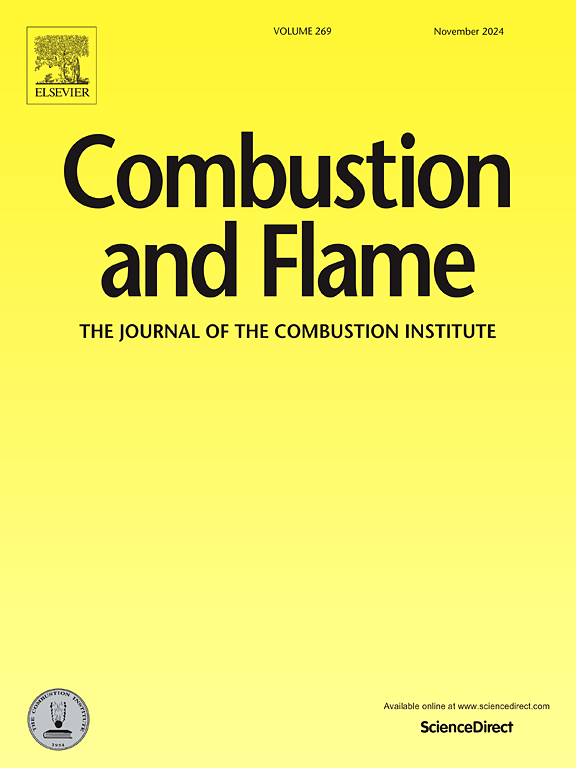推进氨氢燃烧反应动力学:通过基于全局敏感性的聚类构建的信息实验数据集
IF 6.2
2区 工程技术
Q2 ENERGY & FUELS
引用次数: 0
摘要
近年来,氨已成为一种极具前景的零碳能源载体。为了解决其燃烧挑战,与氢混合已被提出作为一种有效的解决方案。这种方法需要对潜在的反应动力学有全面的了解,以便于实际实施。NH3/H2燃烧的大量实验数据提供了通过模型优化推进化学动力学理解的潜力。然而,有效地利用广泛的数据集带来了巨大的挑战,主要是因为在处理大量数据进行模型优化时,计算成本过高。此外,考虑到数据不一致的潜在问题,在没有进行适当质量评估的情况下不加选择地使用所有可用数据是不可取的。为了从现有实验数据集中全面提取动力学信息,促进高效的模型开发,本研究实现了一种基于全局灵敏度的聚类方法。2786个NH3/H2实验数据被划分为40个不同的簇。从每个聚类中选择有代表性的样本来构建一个精简但信息密集的数据集,随后用于模型优化,从而大大增强了模型的预测性能。虽然目前的数据集中存在信息冗余,但由于现有实验数据的限制,反应动力学的某些方面可能仍未被探索。在现有实验设备所能覆盖的实验条件范围内,还有许多未探索的条件区域。为了研究在这些新条件下进行实验对推进NH3/H2燃烧建模的潜在影响,我们系统地扩展了数据集,纳入了6695个理论上可行的实验条件。值得注意的是,八个以前不敏感的反应在这个扩展的框架内显示出显著的敏感性。此外,还确定了对这8个参数具有高灵敏度的11个额外的前瞻性实验条件,并将其纳入现有的信息数据集。随后的模型优化利用这个增强的51个元素的数据集产生显著提高的性能。该研究表明,精心设计的未来实验可以为氨氢燃烧动力学的反应动力学提供新的见解,并为未来的实验研究提供有价值的指导。本文章由计算机程序翻译,如有差异,请以英文原文为准。
Advancing ammonia-hydrogen combustion reaction kinetics: Informative experimental datasets constructed through global-sensitivity-based clustering
Ammonia has emerged as a highly promising zero-carbon energy carrier in recent years. To address its combustion challenges, blending with hydrogen has been proposed as an effective solution. This approach necessitates a comprehensive understanding of the underlying reaction kinetics for practical implementation. The extensive experimental data available on NH3/H2 combustion offers the potential for advancing chemical kinetics understanding through model optimization. However, effectively utilizing the extensive dataset poses significant challenges, primarily due to prohibitively high computational costs when processing large volumes of data for model optimization. Moreover, indiscriminate use of all available data without proper quality assessment is inadvisable, given the potential issues of data inconsistency. To comprehensively extract kinetic information from existing experimental dataset and facilitate efficient model development, this study implements a global-sensitivity-based clustering approach. The 2786 NH3/H2 experimental data are categorized into 40 distinct clusters. Representative exemplars from each cluster are selected to construct a streamlined yet information-dense dataset, which is subsequently employed for model optimization, resulting in a substantial enhancement of the model's predictive performance. Although information redundancy exists in current datasets, certain aspects of reaction kinetics may remain unexplored due to limitations in existing experimental data. Within the range of experimental conditions that current experimental equipment can cover, there are still many unexplored condition regions. To investigate the potential impact of conducting experiments under these new conditions on advancing NH3/H2 combustion modeling, we systematically extend the dataset to incorporate 6695 theoretically feasible experimental conditions. Notably, eight previously insensitive reactions demonstrate significant sensitivity within this expanded framework. Furthermore, eleven additional prospective experimental conditions exhibiting high sensitivity to these eight parameters are identified and incorporated into the existing informative dataset. Subsequent model optimization utilizing this enhanced dataset of 51 elements yields significantly improved performance. This study demonstrates that carefully-designed future experiments can provide novel insights into the reaction kinetics of ammonia-hydrogen combustion kinetics, as well as offering valuable guidance for future experimental investigations.
求助全文
通过发布文献求助,成功后即可免费获取论文全文。
去求助
来源期刊

Combustion and Flame
工程技术-工程:化工
CiteScore
9.50
自引率
20.50%
发文量
631
审稿时长
3.8 months
期刊介绍:
The mission of the journal is to publish high quality work from experimental, theoretical, and computational investigations on the fundamentals of combustion phenomena and closely allied matters. While submissions in all pertinent areas are welcomed, past and recent focus of the journal has been on:
Development and validation of reaction kinetics, reduction of reaction mechanisms and modeling of combustion systems, including:
Conventional, alternative and surrogate fuels;
Pollutants;
Particulate and aerosol formation and abatement;
Heterogeneous processes.
Experimental, theoretical, and computational studies of laminar and turbulent combustion phenomena, including:
Premixed and non-premixed flames;
Ignition and extinction phenomena;
Flame propagation;
Flame structure;
Instabilities and swirl;
Flame spread;
Multi-phase reactants.
Advances in diagnostic and computational methods in combustion, including:
Measurement and simulation of scalar and vector properties;
Novel techniques;
State-of-the art applications.
Fundamental investigations of combustion technologies and systems, including:
Internal combustion engines;
Gas turbines;
Small- and large-scale stationary combustion and power generation;
Catalytic combustion;
Combustion synthesis;
Combustion under extreme conditions;
New concepts.
 求助内容:
求助内容: 应助结果提醒方式:
应助结果提醒方式:


